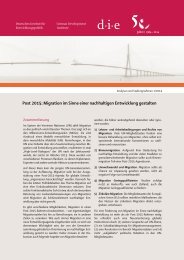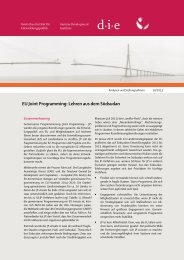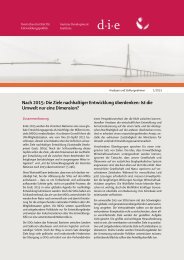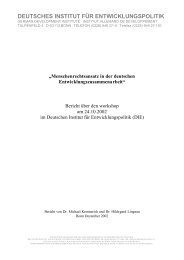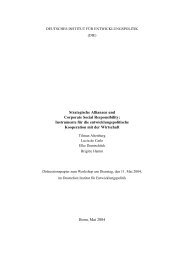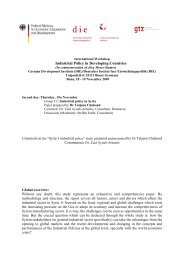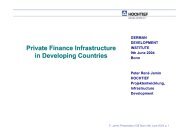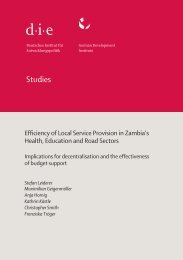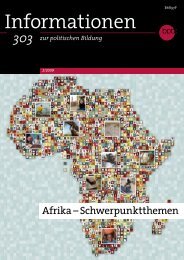Middle East / North Africa and the Millennium Development Goals ...
Middle East / North Africa and the Millennium Development Goals ...
Middle East / North Africa and the Millennium Development Goals ...
You also want an ePaper? Increase the reach of your titles
YUMPU automatically turns print PDFs into web optimized ePapers that Google loves.
160<br />
Markus Loewe<br />
– dealing explicitly with <strong>the</strong> state of <strong>the</strong> MDG process in given partner<br />
countries;<br />
– documenting <strong>the</strong> MDGs to which German DC aims to contribute <strong>and</strong><br />
in fact contributes;<br />
– explaining why German DC aims to support <strong>the</strong> implementation of<br />
precisely <strong>the</strong>se MDGs;<br />
– consistently derive <strong>the</strong> approach <strong>and</strong> <strong>the</strong> measures of German DC<br />
from its stated goals;<br />
– outline in detail <strong>and</strong> in underst<strong>and</strong>able language <strong>the</strong> anticipated causal<br />
nexus between <strong>the</strong> measures it supports <strong>and</strong> <strong>the</strong> goals it seeks to implement;<br />
– explain why German engagement in <strong>the</strong> measures it supports is reasonable<br />
<strong>and</strong> meaningful, i.e. (i) that <strong>the</strong>y help to bridge a crucial capacity<br />
bottleneck in <strong>the</strong> partner country <strong>and</strong> (ii) that German DC is in<br />
possession of comparative strengths vis-à-vis o<strong>the</strong>r donors; <strong>and</strong><br />
– deal more transparently <strong>and</strong> assertively with goals outside <strong>the</strong> MDG<br />
agenda: admit frankly that some German DC measures may have no<br />
immediate relevance to <strong>the</strong> MDGs <strong>and</strong> yet be meaningful in view of<br />
<strong>the</strong> overall situation in a given partner country.<br />
It would fur<strong>the</strong>rmore be important to review regularly whe<strong>the</strong>r <strong>and</strong> to what<br />
extent <strong>the</strong> measures supported by German DC in fact generate <strong>the</strong> expected<br />
effects. The problem here is that <strong>the</strong> impact-analyses presently used<br />
in German DC are not well suited to <strong>the</strong> purpose. They measure only <strong>the</strong><br />
effects of individual projects <strong>and</strong> in part trace impact chains back only to<br />
<strong>the</strong> level of immediate outcomes. It is <strong>the</strong>refore necessary ei<strong>the</strong>r to fur<strong>the</strong>r<br />
develop <strong>the</strong> instruments presently in use to <strong>the</strong> point where <strong>the</strong>y are also<br />
able to measure impacts at <strong>the</strong> MDG level or to create new instruments. A<br />
BMZ working group, which includes representatives of <strong>the</strong> German implementing<br />
agencies, is already working on a solution to this problem.<br />
6.6 Contribution to multilateral DC<br />
Like bilateral German DC, multilateral DC also has to take account of <strong>the</strong><br />
MDG agenda. Germany is one of <strong>the</strong> major contributors to many international<br />
organizations, a fact that permits it to exert considerable influence<br />
on <strong>the</strong>ir development work. Even though this possibility entails substantial<br />
German <strong>Development</strong> Institute



